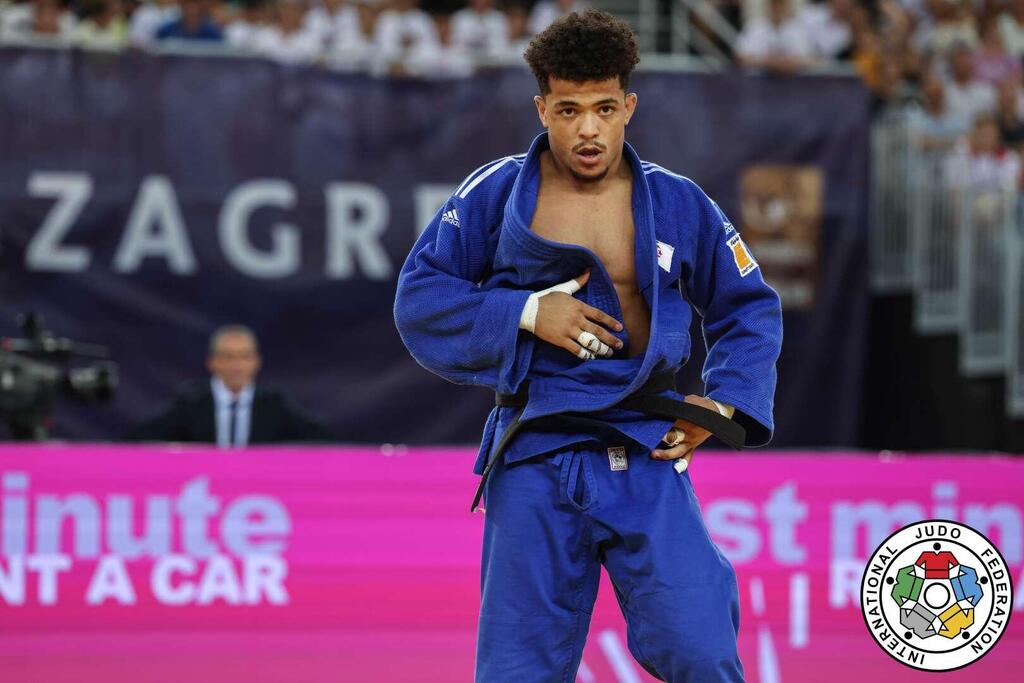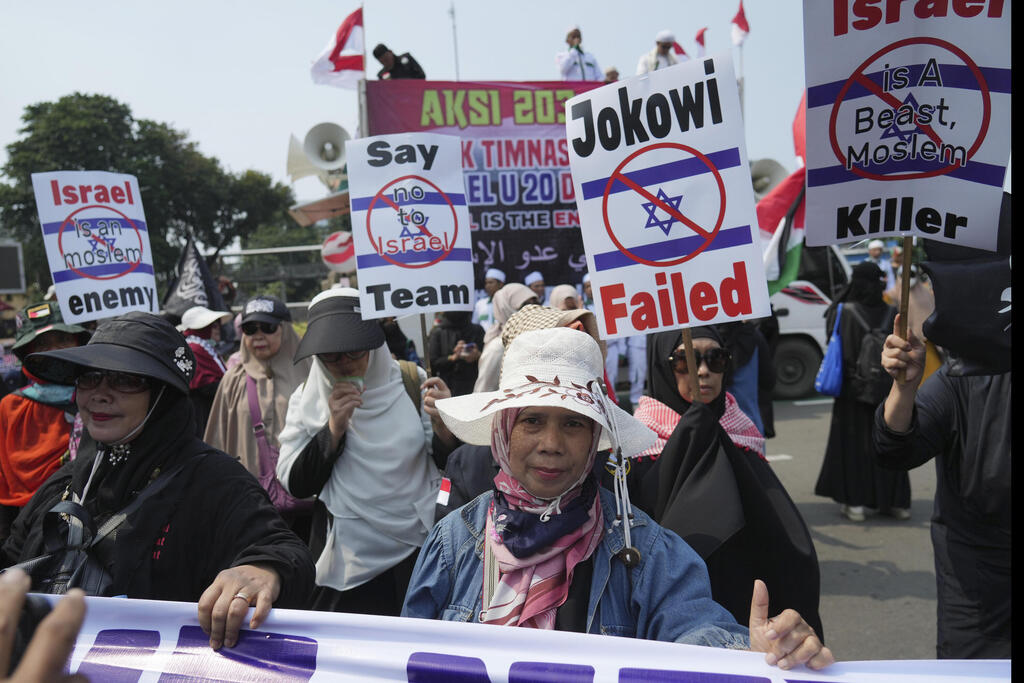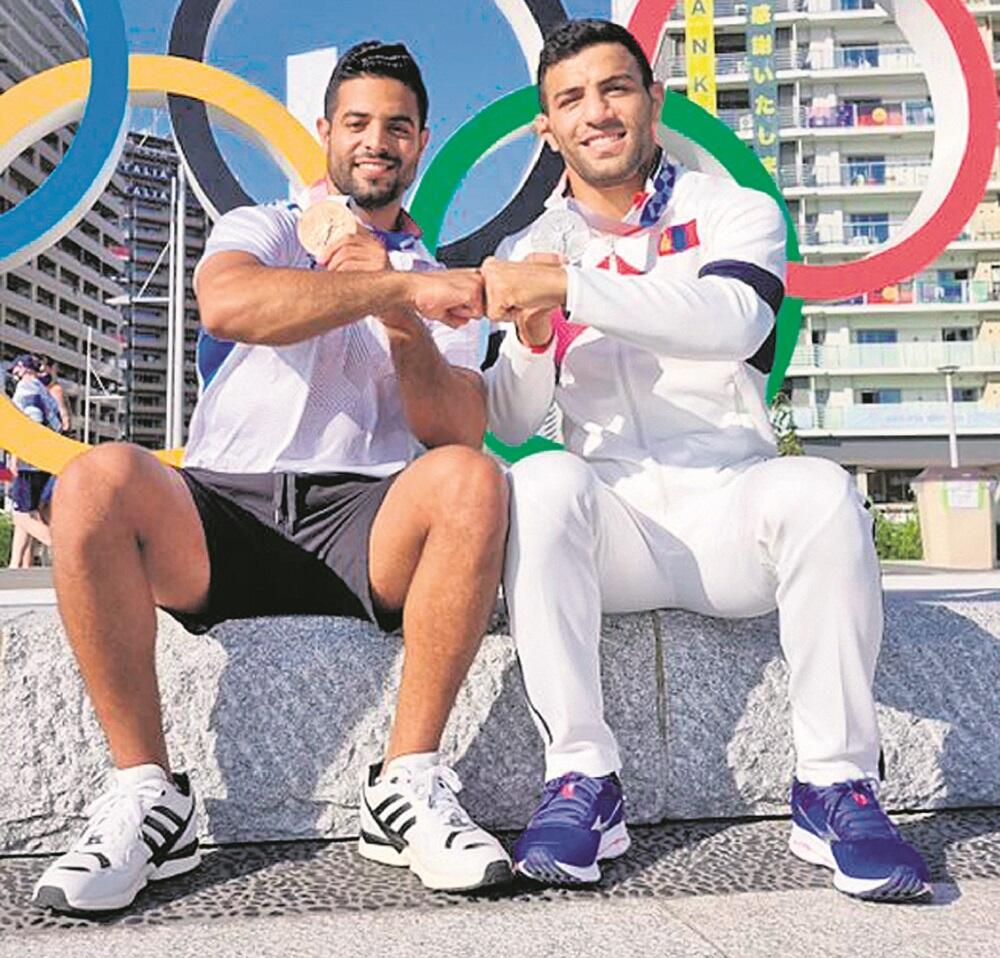Getting your Trinity Audio player ready...
Three years of rigorous training, perseverance, sacrifices, sweat, victories and defeats – three years of an Olympic dream – were dashed for Algerian judoka Messaoud Redouane Dris, who intentionally failed his weigh-in Sunday night. His country does not recognize Israel, and he was scheduled to compete against Tohar Butbul on Monday.
Does this sound familiar? Three years ago, during the Tokyo Games, Butbul was directly seeded into the second round and was supposed to face the winner between Algerian Fethi Nourine and Sudanese Mohamed Abdalrasool. Both withdrew from the competition, with Nourine declaring that he did so in support of Palestine. The judoka and his coach were immediately expelled from the Olympic Village, and the International Judo Federation swiftly imposed a 10-year suspension on Nourine – who subsequently retired from judo and released a parting shot in an interview: "Sports organizations are collaborating with the Zionist enemy. I do not regret it; if I were in Palestine, I would fight alongside the Izz ad-Din al-Qassam Brigades."
Since the draw was held last week, all assessments indicated that Dris would not compete. The head of the delegation, Khiradeddine Barbari, told the website "Shafaq" that "his patriotism should not be doubted," and the judoka took the expected step during the weigh-in.
There is also the matter of the "honor boycott" – Muslims who enter the fight but disrespect the Israeli by refusing to shake hands or bow. This happened to Baruch Shmailov on Sunday, when two opponents from Morocco and Tajikistan ignored him at the end of the matches. As of Sunday, it did not seem that any penalties were planned for the two, in contrast to Rio 2016. Then, Egyptian Islam El Shehaby lost to Or Sasson, refused to bow to him or shake his extended hand, received loud boos from the crowd, was expelled from the Olympic Village, and retired in disgrace.
Muslim countries and athletes have consistently managed to taint sports with politics of hatred and boycotts when it comes to sporting encounters with Israelis. The problem is that in most cases, the boycotters are not punished: Delegations always find "legal" justifications for their absence, such as injury or weigh-in issues, as the Algerians did in Dris's case.
Arab sports boycott dates back to 1954
The Arab sports boycott dates back decades, almost to the founding of the state. It reached some grotesque situations between 1954 and 1974 when the Israel Football Association belonged to the Asian Confederation. The team practically qualified for the 1958 World Cup because all opponents refused to play against it, but FIFA was unwilling to see a representative at the World Cup who had not played in the qualifiers, arranging playoff matches against Wales, which secured the ticket. In 1974, after regular participation and success in competitions in Asia, Kuwait initiated a move that ultimately led to Israel's expulsion from the play on the continent.
Extreme Muslims have successfully avoided encounters with Israelis in combat sports at the Olympics and World Championships and, even when Iranian and Syrian swimmers withdrew from Beijing 2008 to avoid being in the same heat as Israeli representatives, they escaped unscathed. However, they encounter significant problems when they are the hosts, especially in Qatar and the UAE as part of the "sportswashing" effort, the cleaning of their image through sports, which has been common in the Gulf states over the past decade. The solution in these cases is simple: threaten their pockets and honor.
When tennis player Shahar Pe'er was denied entry to Dubai in 2009, she received support from the sport, including from Serena Williams, and the tournament eventually folded as they realized they risked losing sponsorships. In 2017, Tal Flicker won the Abu Dhabi Grand Slam, but the organizers did not allow the display of Israeli symbols, so the flag was not raised and did not on the uniforms, and "Hatikvah" was not played on the podium. The warming of relations ahead of the Abraham Accords and Israeli pressure in the international arena (including an appeal to CAS) led to Israel receiving the proper respect at the same venue a year later when Sagi Muki won gold.
This approach did not work for Indonesia. FIFA stripped it of hosting the recent U-20 World Cup due to its refusal to accept Israel, which had qualified for the tournament. Despite initial claims of severe damage to local football for years, the Indonesians did not pay the price apart from losing the tournament and were "compensated" last year by being awarded the U-17 World Cup. This case is different due to the power of the Islamic bloc within FIFA, which also enjoys substantial funding from the Gulf states and likely did not want to risk an internal crisis. This is also the hope of the leaders of the current initiative to expel Israel from FIFA activities, which is still on the agenda, including Palestinian Football Association Chairman Jibril Rajoub, who was previously suspended and fined by the organization for his incitement against the Argentine national team before their game in Israel.
The Pinnacle of Fear
It is impossible to know what truly goes through the mind of each athlete. For example, Algerian Nourine was genuinely filled with hatred toward Israel, but the story of Iranian judoka Javad Mahjoub is different. In 2011, he admitted to deliberately losing a match in Tashkent to avoid facing Or Sasson ("If I had refused to compete against the Israeli, the Iranian federation would have been suspended for four years"), and he decided to withdraw at the last minute from the London 2012 Olympics out of fear that Arik Zeevi would be waiting for him (the excuse: infection).
For the Tokyo Games, he arrived in a different uniform, representing the Refugee Team, after defecting to Canada. After Israel won bronze in the team event, he posted a photo hugging Sasson on Instagram with the caption: "After 10 years of looking each other in the eyes but fearing to greet or even speak, it is over for me. I wish peace to all people in the world."
The story of Iranian Saeid Mollaei and his remarkable friendship with Israeli Muki is more well-known: his family faced threats to force him to withdraw from the 2019 World Championships before a match with Muki, and he later defected, began representing Mongolia, and even competed in Tel Aviv where he was received with much love.
The other voices
This is the carrot-and-stick approach: The Iranians awarded Arash Miresmaeili a $115,000 grant after he agreed to withdraw from a judo match against Udi Vaks in Athens 2004, while weightlifter Mustafa Rajai was suspended for life after daring to be photographed with Israeli competitor Maxim Svirsky.
Today, Israel finds itself caught between two poles: war and social media. On one hand, the security situation has led to intensified calls for Israel's expulsion from the games, and the national soccer team has faced pro-Palestinian protests during its matches. Iraq even appealed to the International Olympic Committee to remove Israeli flags in Paris. The hatred is not limited to the Arab world but extends to places that have taken on a similar character, like the Swedish city of Malmö – a stronghold of Islam –where they previously tried to avoid hosting Israel in the Davis Cup, and eventually did so without an audience, and incurred heavy fines. Then, of course, there was the Eurovision song contest and the overt hostility displayed toward Eden Golan. In the current period, this hatred was evident, for example, in the "Stop the Genocide" sign accompanied by a Palestinian flag, displayed without hindrance on the field before the Women's Champions League final between Barcelona and Lyon.
On the other hand, while many Muslim countries understand that the path to the West goes through normalization with Israel, surfers also bring other voices. This is especially true in the context of Iran, where a youth campaign emerged against "the dirty intervention of the dirty people behind the scenes who dirty Iranian sports with their politics" after a wrestler deliberately lost to avoid facing an Israeli.
It's a delicate game between a country's official policy and what happens on its streets, and between what an athlete dreams of doing and what they are forced to do.





